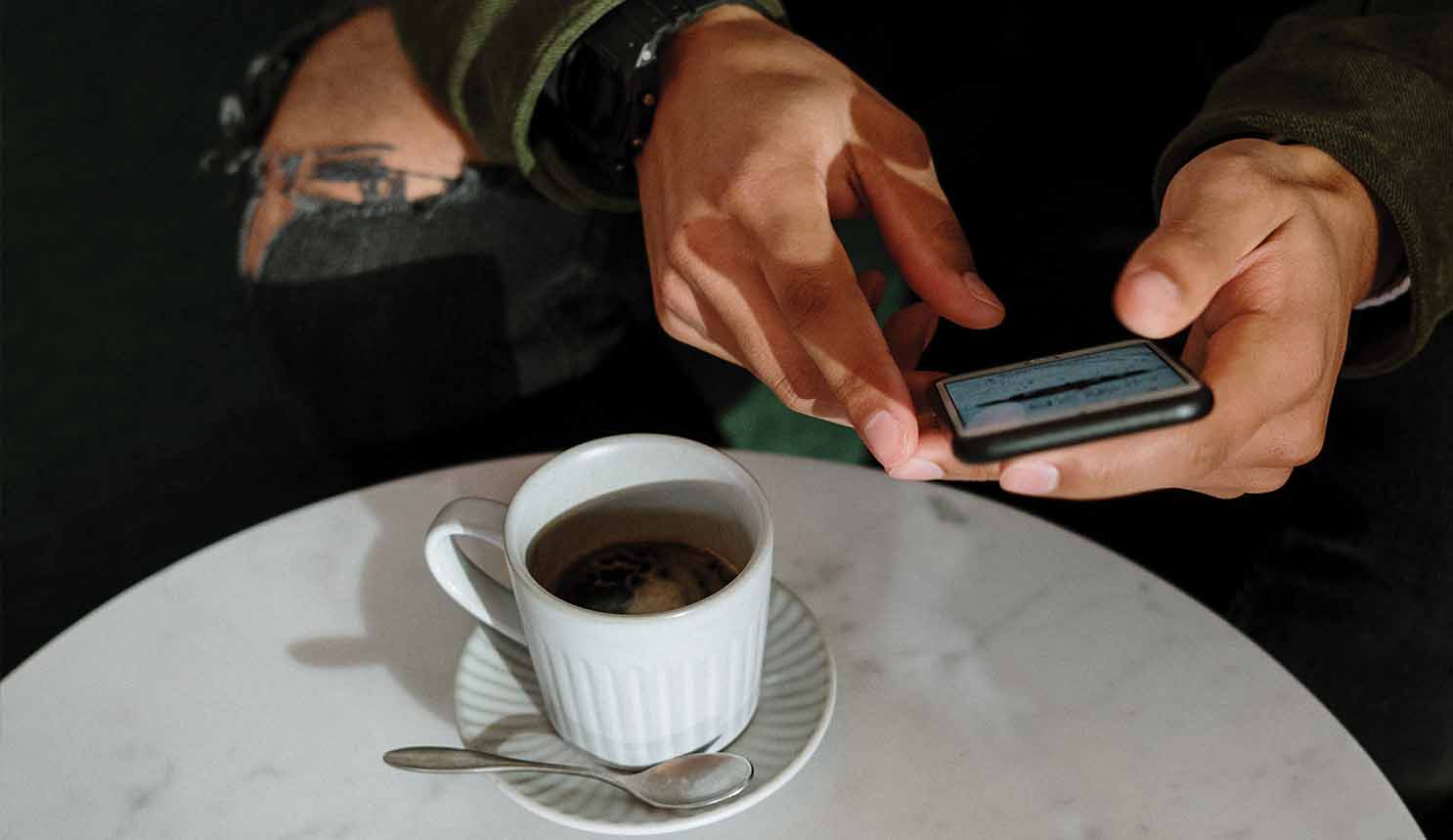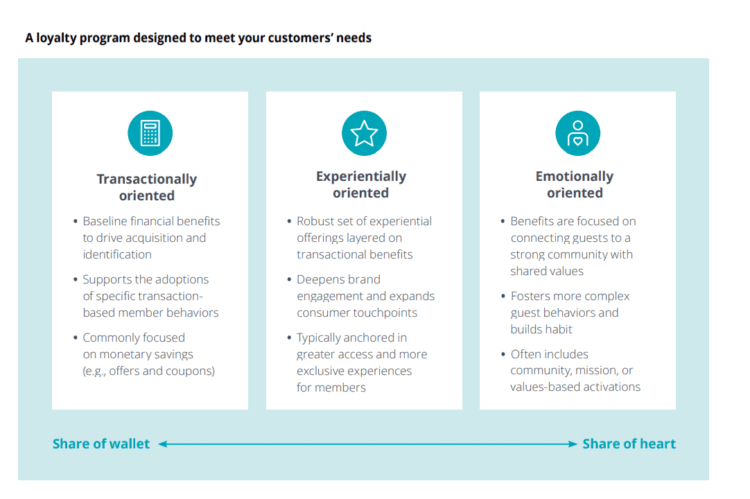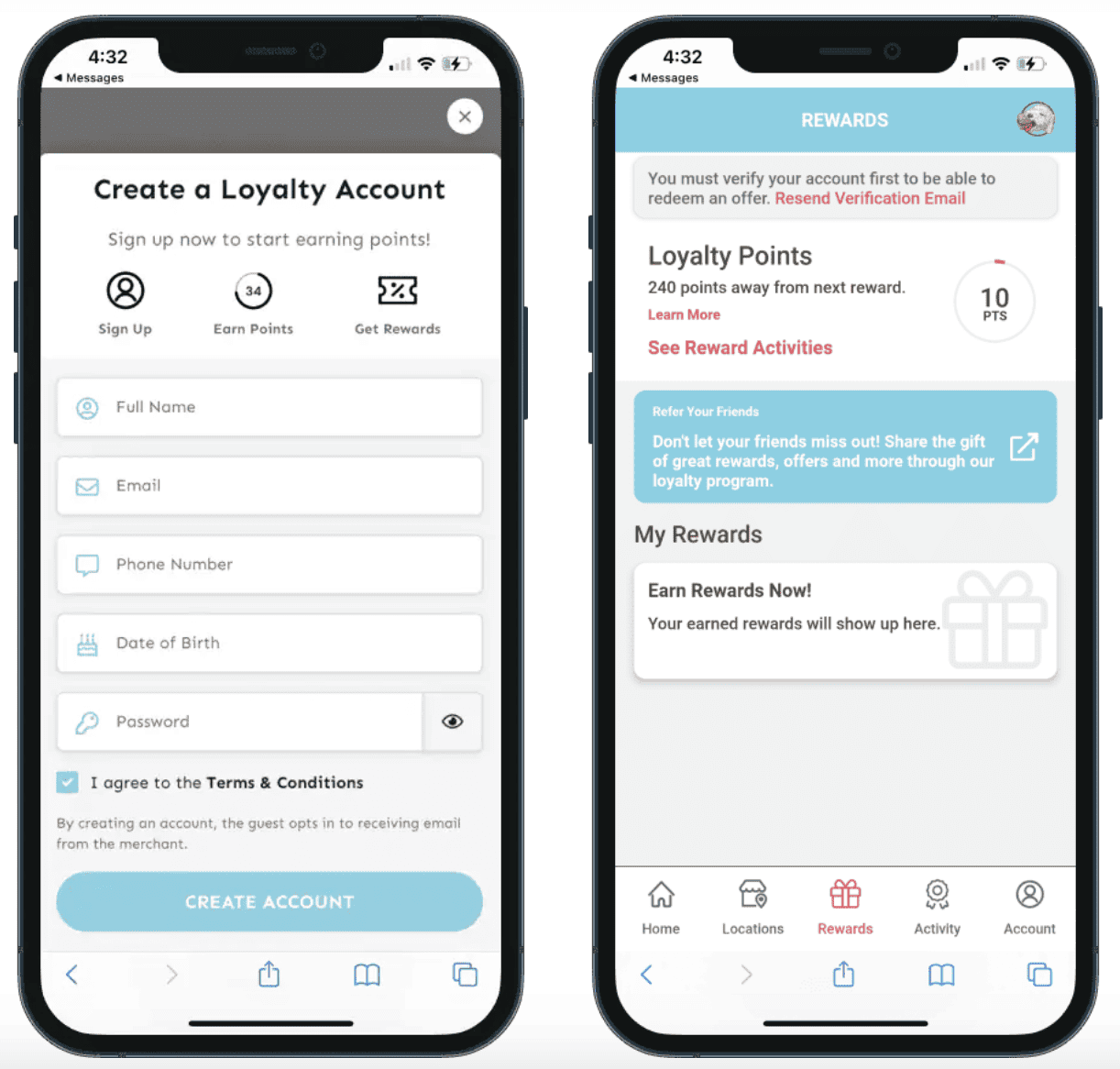
Loyalty Program ≠ Loyalty: Rewriting the Narrative
It’s time to set the record straight. Simply developing and offering a restaurant loyalty program does not magically create loyal customers. However, that doesn’t mean loyalty programs are ineffective. Loyalty programs are meant to reward loyalty, not create it, which is why they’re also known as rewards programs. True customer loyalty is created from the sum of the many parts that make up your restaurant brand – to name a few: food quality and presentation, price point, voice/personality, atmosphere, and the overall customer experience (where loyalty comes into play).
So if not loyalty, what then should you expect from your loyalty program? We see three major benefits of mobile loyalty programs:
Driving app usage: To entice customers to download and use your app consistently, you need to provide them with a compelling value proposition. Your app will need to solve a problem or offer significant benefits, otherwise it will likely disappoint your customers. By integrating a restaurant loyalty program into your app, you can create value and incentivize downloads with discounts, free items, or other loyalty perks. However, for your loyalty program to truly offer value, it’s important to look beyond the simple punch card mindset and evaluate what kinds of rewards will resonate most with your guests (more on that later).
Increase customer lifetime value (CLTV): Well-executed loyalty programs have the power to boost customer frequency, average ticket size, or both. While skeptics argue about selection bias, claiming that loyalty members are already high-value customers, there is evidence to suggest that loyalty programs positively impact customers across various spending levels.
Studies also show that loyalty members tend to spend significantly more than non-loyalty members, while offering a valuable loyalty program can increase customer retention. Subsequently, just a 5% increase in customer retention can lead to a profit increase of 25% – 95%.
Gather invaluable 1:1 customer data: If you’re still skeptical about loyalty programs’ impact on CLTV, consider the value of capturing individual customer data. By encouraging customers to identify themselves through loyalty programs, you gain comprehensive insights into their behaviors and preferences. This data allows for personalized targeting, tailored offers, and individualized engagement strategies. A former technology executive at Dunkin’ explains:
“As a result of our technology initiative we have more robust data on our guest transactions than we’ve ever had in the past, and we’re using it to change guest behavior. We were able to track our guest behavior and engage with them on a 1:1 individualized basis. We’ve created member segments for our Perks members, and we’re targeting our members with offers relevant to both their segment and their individual behavior.”
Key Features, Functionality, and Integrations
Implementing the right loyalty software is crucial for the success of your restaurant loyalty program. Here are the key aspects to prioritize in your selection process:
Seamless Integration with Point-of-Sale (POS) Systems
Integrating your loyalty software with your POS system is vital for a smooth customer experience and efficient operation. Look for loyalty software that seamlessly integrates with your existing POS system, allowing for real-time data synchronization and automatic reward redemption. This integration ensures that loyalty points, rewards, and customer information are easily accessible and updated across all touchpoints. By choosing a platform that directly integrates with your POS, you can avoid the headache of dealing with middleware or any extra steps to get your data to sync correctly.
Mobile-Friendly and User-Centric Design
In today’s mobile-driven world, it’s essential to prioritize mobile-friendly loyalty software. Your loyalty program should offer a user-centric design with an intuitive interface, easy navigation, and a seamless mobile app experience. Customers should be able to access their loyalty rewards, track their progress, and redeem rewards effortlessly using their smartphones. Remember, a clunky or complicated loyalty program interface may discourage customers from actively participating.
Customizable Loyalty Program Structures
Every restaurant has unique requirements and goals for their loyalty program. Look for loyalty software that offers flexibility and customization options, allowing you to tailor your program to align with your brand identity and customer preferences. The ability to define reward tiers, point systems, and personalized incentives enables you to create a loyalty program that resonates with your target audience.
Omni-Channel Engagement Capabilities
To maximize the reach and impact of your loyalty program, seek software that supports omni-channel engagement. Your loyalty program should seamlessly integrate with various customer touchpoints, such as your website, mobile app, social media platforms, kiosks, and in-store interactions. This integration ensures consistent messaging, rewards accessibility, and engagement opportunities across all channels.
Automated Marketing and Targeted Campaigns
Efficient loyalty software should empower you to launch targeted marketing campaigns and automate personalized communications. Look for features such as customer segmentation, triggered notifications, and automated reward reminders. These capabilities allow you to send app notifications, text messages, and email campaigns with tailored offers, promotions, and exclusive rewards based on individual customer behaviors and preferences. By delivering relevant and timely messages, you can foster a sense of connection and increase engagement.
Analytics and Reporting Tools
Data is the lifeblood of any successful loyalty program. Choose loyalty software that provides robust analytics and reporting tools. These tools should offer actionable insights into customer behaviors, preferences, and program performance. Access to real-time data enables you to make informed decisions, fine-tune your program strategies, and identify areas for improvement. Detailed reports on customer engagement, redemption rates, and overall program effectiveness empower you to optimize your loyalty program continually.
Tips for a Successful Loyalty Program
As we mentioned earlier, to create real value for customers, your restaurant loyalty program should go beyond the basic punch card paradigm (e.g. rewards after X number of visits).
While transactional rewards like freebies and discounts should be a part of any loyalty program, as these programs evolve, operators will need to think about how rewards will resonate with guests while reflecting their brand’s values and personality. A good way to plan your loyalty offer is to think about rewards on a spectrum grouped into the categories of transactional, experiential, and emotional, as illustrated in the figure below from the Wall Street Journal.

Buffalo Wings and Rings is a restaurant that does an excellent job of communicating its brand through its loyalty program while offering both transactional and experiential rewards. In name, their “Buffalo Sauciety” VIP Rewards program is cleverly tied to the brand’s core offering (wing sauce), while the “VIP” aspect ties into their sports arena theme. The program follows a simple $1 spent to one point earned structure, while points can be redeemed for discounts or exclusive experiences and in-store perks.
Lazy Dog Restaurant and Bar takes the concept of a loyalty program a step further by offering a paid membership program, the Lazy Dog Beer Club. Instead of accruing points based on purchases, customers can buy a quarterly membership, which includes a themed package of 8 craft beers with a pint glass, monthly beer samplers available in-store, $39 of dine-in credit, 10% off all online orders and to-go beer, priority seating, and early access to rare beer releases. This not only reinforces Lazy Dog’s brand position as a restaurant that’s serious about craft beer, but also builds and engages a community of loyal customers while touching on all three rewards categories (transactional, experiential, and emotional).
In today’s competitive restaurant industry, loyalty programs play a crucial role in fostering customer loyalty, increasing customer lifetime value, and driving business growth. By selecting the right loyalty software and implementing key features, functionalities, and integrations, you can create a compelling loyalty program that resonates with your customers.
Related: Online ordering systems for gas stations
Remember, loyalty programs are not a one-size-fits-all solution. Tailor your program to align with your brand identity, leverage mobile technology, and focus on personalized engagement. Continuously analyze and optimize your program using data-driven insights to ensure its effectiveness and relevance. With the right loyalty program and a customer-centric approach, you can turn your loyal customers into brand advocates and boost your restaurant’s success in the long run.

